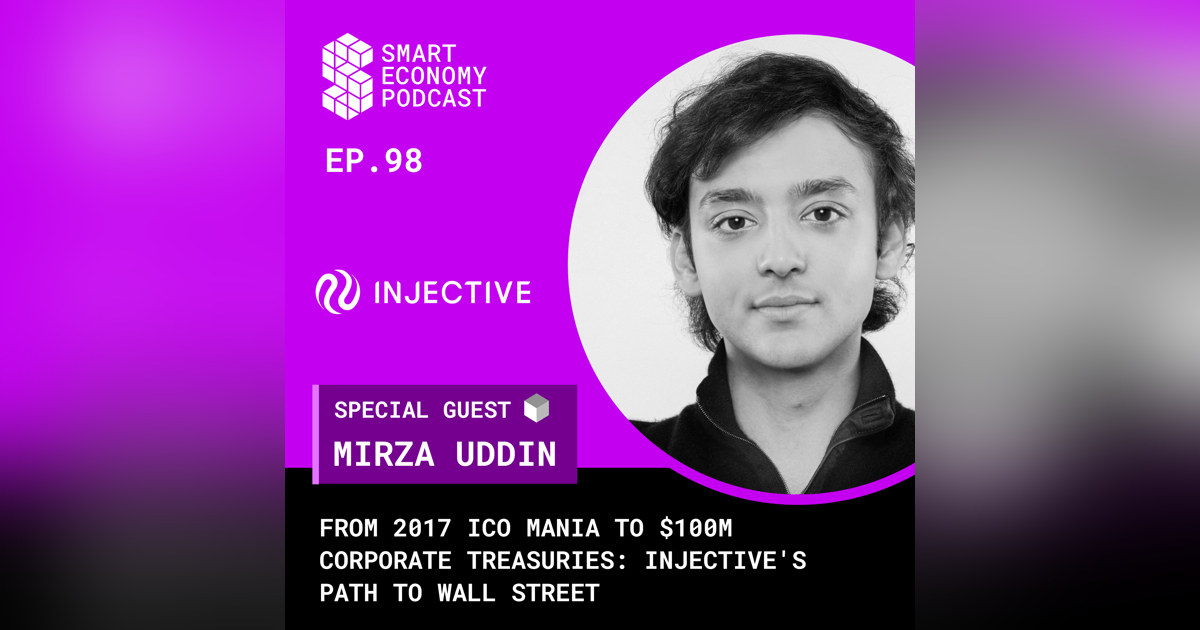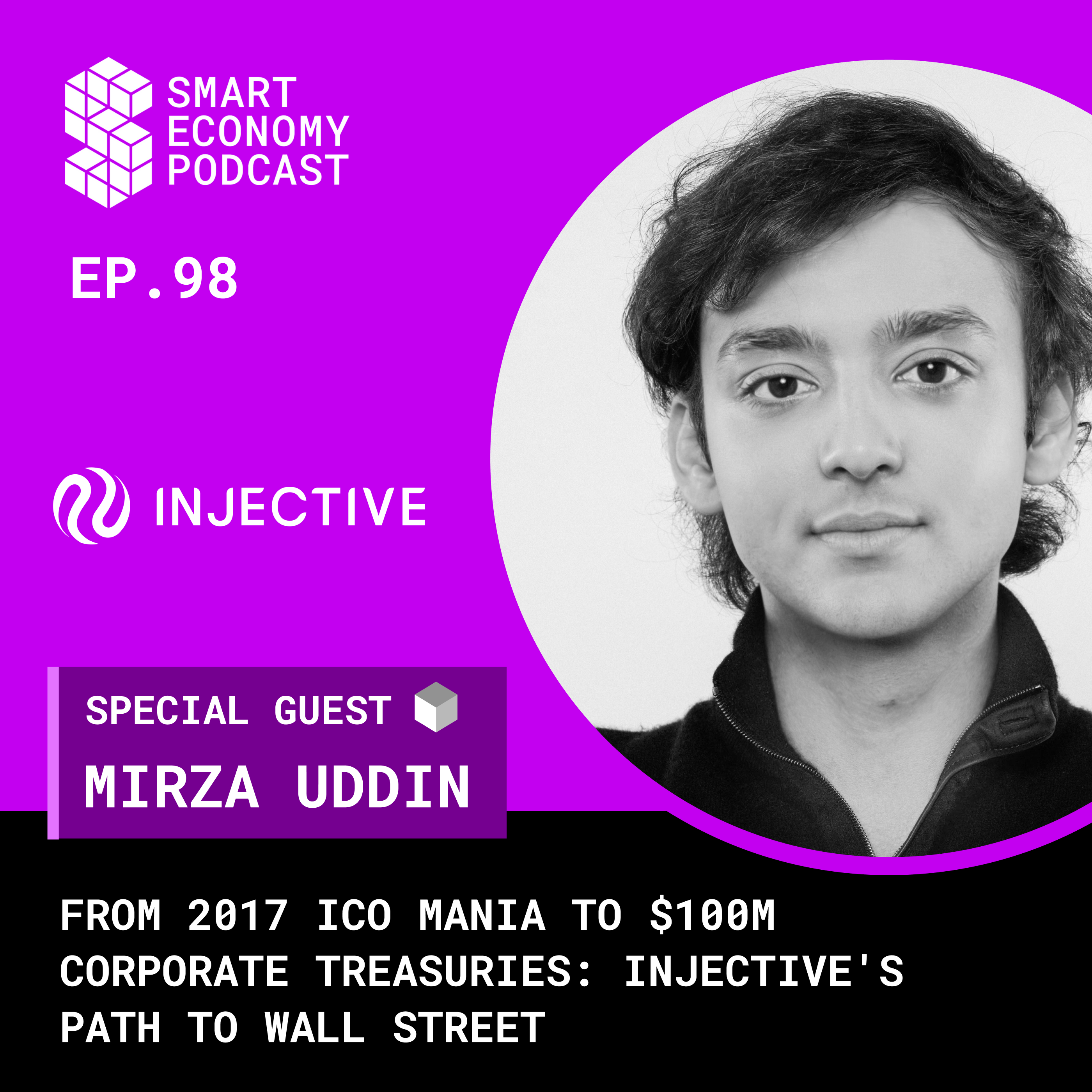Oct. 9, 2025
From 2017 ICO Mania to $100M Corporate Treasuries: Injective's Path to Wall Street

The player is loading ...

In this episode of The Smart Economy Podcast, host Dylan Grabowski is joined by Mirza Uddin, head of business development at Injective, a blockchain-based platform building infrastructure for DeFi, aiming to enable truly open, permissionless, and interoperable financial systems. Together, they sat down for an insightful conversation about long-term thinking in crypto, creative inspiration from anime, the rise of decentralized finance infrastructure, and how Injective achieved true product-market fit.
What you’ll learn:
- How creative outlets like sci-fi and anime can inspire innovative blockchain solutions
- Why sustainable blockchain projects need decades of commitment rather than quick wins
- The strategic advantages of building on both Cosmos SDK and EVM technology stacks
- How Injective achieved 54.7M staked tokens through community-focused development
- Why traditional finance partnerships signal mainstream adoption
- How staked token ETFs could revolutionize retail investor access to blockchain yields
- Why solving user experience friction remains crucial for DeFi adoption
And much more!
Mirza Uddin is the head of business development at Injective, as well as co-founder and general partner at Vessel Capital, where he brings vast expertise in blockchain technology and decentralized finance. With a background in venture capital and cryptocurrency dating back to 2013, Mirza has been instrumental in developing Injective's financial-focused blockchain platform and driving strategic partnerships with Wall Street institutions. His dual role as both an operator and investor through Vessel Capital, where he takes a hands-on approach using personal capital to back promising projects, provides him with unique insights into the cryptocurrency ecosystem.
Episode Highlights:
[00:15:30] Building Sustainable Blockchain Projects
Mirza emphasizes that transformative change in blockchain takes decades, not overnight success. The key insight is focusing on product development and real user value rather than token price speculation. Many projects in 2017-2018 produced fancy whitepapers but never built anything substantial, leading to their eventual failure. By contrast, successful projects like Injective were forced to build actual products even with minimal funding, which created genuine value. Teams must be willing to persist through multiple bear markets while continuously improving their product. The lesson for builders is that lasting success comes from users finding genuine value in your work, not from short-term token gains.
[00:36:45] Product Differentiation Strategy
The average user doesn't care if something is on-chain or off-chain - they care about unique functionality and ease of use. Blockchain projects need to offer features and capabilities that centralized alternatives cannot provide. For Injective, this meant enabling users to build their own exchanges and create custom markets rather than just replicating existing CEX functionality. Projects must justify the added friction of using blockchain by delivering compelling advantages. This strategy helped Injective achieve product-market fit by focusing on real user needs rather than ideological decentralization.
[00:42:30] Technical Stack Evolution
Injective's decision to build on both Cosmos SDK and EVM demonstrates the importance of technical flexibility. The Cosmos SDK provided the customization needed for their core orderbook and trading features, while adding EVM support opened access to the largest developer ecosystem. Rather than choosing between technical stacks, they found ways to leverage the advantages of both. This hybrid approach allows projects to maintain their unique capabilities while expanding their reach. The lesson is that technical decisions should serve business goals rather than ideological preferences.
[00:50:45] Strategic Wall Street Integration
The partnership with Pineapple Financial showcases how blockchain projects can meaningfully integrate with traditional finance. Rather than pursuing superficial corporate treasury deals, Injective focused on partners who could bring real financial activity on-chain. Their approach centers on finding synergies where blockchain can enhance existing financial services like mortgage securitization. Teams should look for partnerships that drive actual usage rather than just token price appreciation. This strategy creates sustainable value by solving real business problems rather than chasing short-term gains.
Previous guests include: Rusty Matveev, Chief Strategy Officer at Calaxy; Andrew Lawrence, CEO and Co-Founder of Censo; Zac Townsend, CEO and Co-Founder of Meanwhile; Jesper Johansen, CEO and Co-Founder of Northstake; Tama Churchouse, COO of Cumberland Labs; Holly Wood of Boson Protocol; Sid Powell of Maple Finance; Chad Barraford of THORChain; and many others.
Check out our three most downloaded episodes:
- Laying the Groundwork for a Billion-User Blockchain with Rich Rines, Contributor at Core DAO
- Staking the Future: From Blockchain Beginnings to Institutional Innovations with Chen Zhuling of RockX
- The Unstoppable Nature of Blockchain: A Conversation with Bonart Mati of Obligate
Attention all blockchain, crypto, and Web3 professionals! If you're a founder, CEO, or expert doing something innovative in this space, we're interested in speaking to you! Apply to be a guest on our platform and connect with our vibrant community of blockchain professionals: https://fame.so/nnt-guest
The Smart Economy Podcast is handcrafted by our friends over at fame.so







